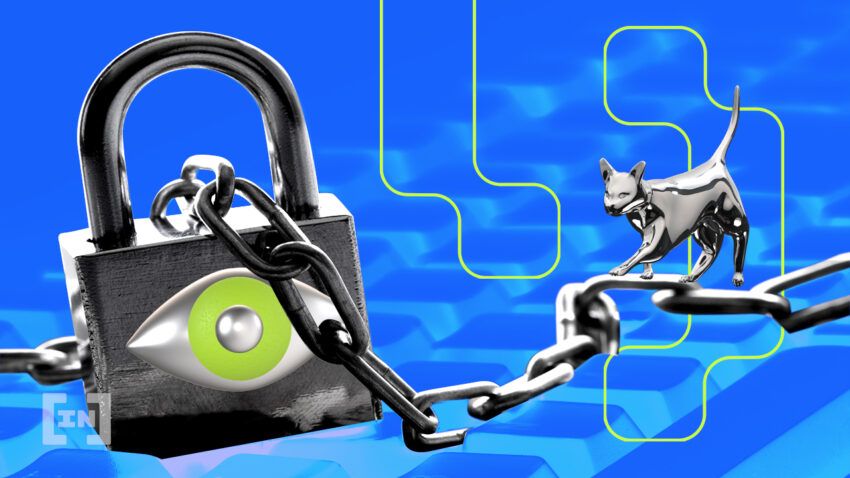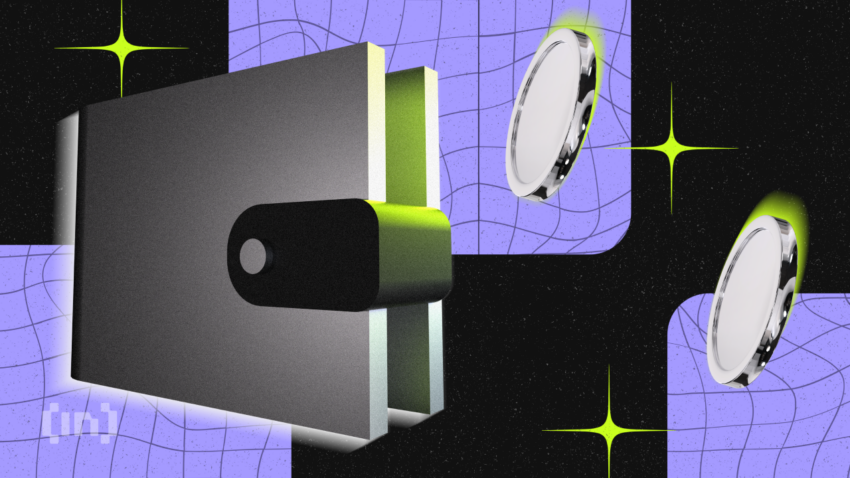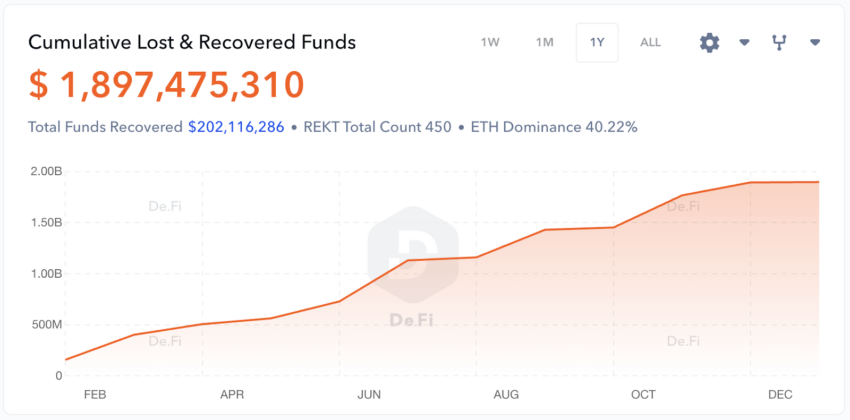What is the best wallet for altcoins? Before choosing a random crypto wallet for your coins and tokens, take a moment to consider all available options and make an informed decision. Ultimately, your cryptocurrency security is only as good as your chosen altcoin wallet. Here are our 11 best altcoin wallets that will provide secure crypto storage for your investments in July 2025.
Methodology
For each crypto wallet in this list, BeInCrypto conducted extensive testing over a period of six months. Our testing teams employed a number of stringent criteria, the most vital being the security, technology and protocols used, number of blockchain networks supported, and quality of feedback received from users and our teams.
Here’s a breakdown of some of the reasons each individual wallet made the list.
• Includes integrated exchange features for seamless cryptocurrency trading.
• Accessible as both a web extension and a mobile app for user convenience.
• Is particularly suitable for DeFi applications, favored by blockchain developers.
• Supports a wide range of EVM-compatible networks like BNB Chain, Polygon, and Avalanche.
• Provides open-source wallet codes, promoting transparency and community collaboration.
• Offers advanced security features, including passphrase and HD backup settings.
• Wallet has good adaptability. MetaMask was initially designed for Ethereum-based tokens but evolved to include other blockchains.
Coinbase Wallet:
• Autonomy in management: Ensures autonomy in managing private keys enhancing digital asset security.
• Separation from exchange platform: Distinct from Coinbase.com, emphasizing user security and autonomy.
• Highlights a focus on user security as a fundamental aspect of the wallet.
• Popular among traders and investors, emphasizing its reliability as an altcoin storage solution.
OKX Wallet:
• Recognized as one of the best altcoin wallets for its versatility and comprehensive features.
• Stands out with support for over 70 different blockchains, ensuring adaptability.
• Integration with cross-chain swaps facilitates easy exchange of tokens across different networks.
• Proprietary X Routing technology ensures competitive rates for token exchanges.
• Offers full NFT functionality, enhancing engagement with the wider Web3 ecosystem.
• Provides seamless access to a vast array of over 1,000 DeFi and GameFi DApps.
• Decentralized and non-custodial: Ensures a decentralized, non-custodial nature, granting users full control over their assets.
Halo Wallet:
• Innovative integration of web3 and social media elements
• Wide support for a large array of tokens and NFTs
• Native cross-chain swaps: Offers native cross-chain swaps, enhancing flexibility in asset management.
• Provides staking services for users seeking rewards from their crypto holdings.
• Focuses on providing valuable investment insights and recommendations based on user risk preferences.
• Integrates with various social media protocols for a comprehensive web3 Decentralized Identity (DID).
Zengo Wallet:
• Stands out for exceptional security features, utilizing MPC cryptography for virtually unhackable protection.
• Supports a diverse range of over 120 crypto assets, including popular altcoins.
• Offers easy management of digital assets and web3 DApps.
• Features secure account recovery options, enhancing overall safety.
• Provides inheritance options for users to plan for the transfer of their assets.
• Incorporates a web3 firewall for enhanced security against online threats.
• Acclaimed 24/7 customer support adds to the wallet’s reliability and ease of use.
Nexo Wallet:
• Integrates smart contract technology and eeb3 functionalities for efficient altcoin management.
• Has the ability to execute batch transactions, significantly reducing gas fees.
• Offers flexibility in fee payments with various options, including stablecoins.
• Supports earning passive income through DeFi protocols.
• Provides a unified dashboard for managing multiple wallets across key networks.
• Emphasizes security and user convenience for a seamless altcoin management experience.
Trezor Wallet:
• Stands out as one of the top choices for altcoin storage due to exceptional hardware wallet security.
• Provides offline storage, protecting assets from online threats.
• Accessible to both crypto novices and veterans with a user-friendly interface.
• Supports over 8,000 coins and tokens, ensuring versatility for varied portfolios.
• Established reputation for reliability, backed by a decade of industry presence and trust from over a million users.
SafePal Wallet:
• Recognized for a strong focus on security with a 100% air-gapped, fully offline cold-storage mechanism.
• Supports over 100 blockchains and their tokens with unlimited storage capacity.
• SafePal S1’s compact, credit card-sized design allows for highly portable altcoin management.
• Enhanced by multiple layers of security, including an EAL 5+ independent secure element and true random number generator.
• Provides a highly secure environment for crypto assets with 24/7 access.
NGRAVE Wallet:
• Recognized for unparalleled security features and advanced technology.
• The first hardware wallet with an EAL7-certified operating system ensures top-tier security.
• Complete offline functionality, including air-gapped signing mechanisms, provides robust protection.
• Incorporates user-friendly aspects like biometric verification and a sleek touchscreen interface.
Ledger:
• Offers a comprehensive range of services, including hardware wallets (Nano X, Nano S Plus, Stax), software wallets, and a mobile app.
• Known for strong security measures, including offline storage and secure element chips.
• Provides versatile software options and a user-friendly interface through Ledger Live software.
• Allows easy management of digital assets and access to decentralized applications (DApps).
• Offers staking services, allowing users to earn rewards from their crypto holdings.
D’CENT Biometric Wallet:
• Stands out with cutting-edge security features, including a Certified Secure Chip and advanced fingerprint technology.
• User-friendly design and one-handed operation for easy use.
• Features secure Bluetooth connectivity for enhanced functionality.
• Includes features for NFT management, contributing to a comprehensive altcoin storage solution.
• Allows real-time access to crypto data for a comprehensive altcoin management experience.
Overall, all of these wallets were identified as being solid options for a variety of users looking to buy and store altcoins, as well as interact with decentralized ecosystems.
For additional info on BeInCrypto’s methodology and verification practices, follow this link.
- Best altcoin wallets in July 2025
- 1. MetaMask
- 2. Coinbase Wallet
- 3. Exodus Wallet
- 4. OKX Wallet
- 5. Halo Wallet
- 6. Zengo Wallet
- 7. Nexo Wallet
- 8. Trezor
- 9. SafePal
- 10. Ledger
- 11. D’CENT
- What are altcoin wallets?
- What are the advantages of altcoin wallets?
- How do altcoin wallets work?
- Types of altcoin wallets
- Hot wallet vs. cold wallet
- What to consider when choosing altcoin wallets?
- How to set up altcoin wallets
- How to store your coins in a wallet
- Selecting the right wallet
- Safeguarding your altcoins
- Best wallets for altcoins comparison chart
- What is the best altcoin wallet for you?
- Frequently asked questions
Best altcoin wallets in July 2025
1. MetaMask
MetaMask is a comprehensive platform designed for managing digital assets in the web3 world. It offers real-time market data and a user-friendly interface, making it easy to track, buy, swap, bridge, and stake digital assets.
This all-in-one application is a central hub for users to control their digital assets effectively, simplifying the process by reducing the need for multiple tabs and wallets. It’s tailored for those who want to navigate and manage their presence in the expanding web3 space easily and efficiently, all from one central location.
- Secure and user-friendly
- Wide blockchain integration
- Versatile and mobile-compatible
- Browser extension dependency
- Unclear withdrawal policy from mine pools
- Chain swapping issues
- Browser compatibility problems (issues with Chrome and Safari)
MetaMask is a highly versatile and user-friendly crypto wallet. It’s free and offers integrated exchange features, making it an ideal choice for beginners and experienced users. The wallet is accessible as both a web extension and a mobile app, providing flexibility.
Notably, MetaMask is particularly suitable for DeFi applications and is favored by blockchain developers. It supports various EVM-compatible networks like BNB Chain, Polygon, and Avalanche. Its open-source wallet codes and advanced security features, including passphrase and HD backup settings, ensure a secure experience. Although initially designed for Ethereum-based tokens, it has evolved to include other blockchains, reflecting its adaptability and commitment to user needs.
2. Coinbase Wallet
The Coinbase Wallet is a digital wallet created by Coinbase, a prominent global cryptocurrency exchange. It’s available as both a mobile app and a browser extension, offering versatile access for users. This wallet is designed to facilitate various crypto-related activities. It allows users to directly purchase cryptocurrencies from Coinbase, a notable feature for those who prefer the convenience of buying within the same ecosystem.
- User-friendly interface
- Known for its strong security measures
- Access to Ethereum-based DeFi apps
- Support for various altcoins, including Solana
- Limited altcoin support compared to competitors
- The app mainly supports Ethereum, Solana, and a few EVM (Ethereum Virtual Machine) compatible networks
Coinbase Wallet offers a distinct and secure way for traders and investors to store their digital assets. Unlike Coinbase.com, the associated exchange platform, Coinbase Wallet provides users complete control over their private keys or seed phrases.
This autonomy in managing private keys is a crucial aspect of digital asset security, as it ensures that users have exclusive access to their funds without relying on a third party. This feature particularly appeals to those prioritizing having personal control over their digital assets, a fundamental aspect of cryptocurrency ownership.
The wallet’s popularity among traders and investors further highlights its reliability and effectiveness as an altcoin storage solution.
Coinbase Wallet is a self-custody crypto wallet, and it supports the following networks: Ethereum, Polygon, Bitcoin, Dogecoin, Litecoin, Stellar Lumens, Ripple, Solana, Arbitrum, Avalanche C-Chain, BNB Chain, Fantom Opera, Optimism, and Gnosis.
3. Exodus Wallet
Exodus is a legacy software development company in the cryptocurrency space. The company has been around for about a decade and has created several secure crypto wallets. Exodus wallets are non-custodial, allows you to manage crypto and NFTs on about 50 different blockchains, and has in-app swapping capabilities.
- 24/7 customer support
- Supports a wide range of cryptocurrencies
- Cross-chain swaps
- Supports WalletConnect
- Limited features compared to competitors
We chose Exodus wallet, not only because it supports more than 50 blockchains, but also because it supports a variety of NFTs on 16 different blockchains as well. As a result, Exodus supports altcoins as well as the assets that reside on some of them.
Additionally, customers can enjoy 24/7 live customer support. The wallet is available on Android, iOS, Mac, Windows, Linux, Chrome, and Brave,. You can make in-app cross-chain swaps and use the staking features directly inside the wallet, making it easier to earn from a safe place.
Exodus Wallet supports 50+ networks, including Bitcoin, Ethereum, Solana, BSC, Polygon, Avalanche, Tron, Arbitrum, etc. The wallet can recognize and connect to different networks and swap across chains.
4. OKX Wallet
The OKX Wallet is a versatile, self-custody crypto wallet developed by OKX, one of the world’s largest crypto exchanges and a prominent web3 technology company. This wallet integrates with a wide range of blockchain technologies, supporting a total of over 70 different blockchains. It’s a comprehensive gateway to the web3 world, offering users access to various decentralized services, including exchanges (DEXs), DeFi yield services, NFT marketplaces, and a diverse array of decentralized applications (DApps).
- Wide range of cryptocurrencies
- Cross-chain swaps
- Global accessibility
- NFT Integration
- Complexity for beginners
- Potentially overwhelming variety
- OKX exchange is not available in the U.S. and Canada
OKX Wallet is one of the best altcoin wallets for storing crypto due to its exceptional versatility and comprehensive features. It stands out with its support for over 70 different blockchains, making it incredibly adaptable for managing a diverse range of cryptocurrencies.
The wallet’s integration with cross-chain swaps and the proprietary X Routing technology ensures users can easily exchange tokens across different networks at competitive rates. Additionally, its full NFT functionality and seamless access to a vast array of over 1,000 DeFi and GameFi DApps make it an ideal choice for users seeking to explore and engage with the wider web3 ecosystem.
The wallet’s decentralized, non-custodial nature, granting users full control over their assets, further solidifies its position as a top choice for secure and efficient crypto management.
OKX wallet supports 70+ networks, including Bitcoin, Ethereum, OKC, Solana, BSC, Polygon, Avalanche, Tron, Arbitrum, etc. The wallet can recognize and connect to different networks without switching. OKX wallet has a multi-chain and cross-chain DEX and offers yield farming, an NFT marketplace, and DApp discovery.
5. Halo Wallet
Halo Wallet, formerly KuCoin Wallet, is a web3 social wallet that integrates financial and social networking capabilities. Its primary goal is to serve as a user entry point into the SocialFi ecosystem. The wallet accomplishes this by aggregating activities from various protocols and presenting them in an easy-to-follow social feed format. This approach allows users to monetize the data value of their social networks.
- Offers extensive support for both mobile and PC platforms
- Asset diversity, including NFT assets
- Native cross-chain swaps and staking services
- Over 1 million users
- Decentralized governance
- Uses leading security technology audited by Hacken
- Complexity for average users
- Focused on web3 and SocialFi, might not be the ideal choice for users looking for a simple, traditional crypto wallet
Halo Wallet is one of the best altcoin wallets because it integrates web3 and social media elements, making it more than just a traditional crypto wallet. It stands out for supporting a vast array of tokens and NFTs, native cross-chain swaps, and staking services, catering to a wide range of crypto needs.
Additionally, its focus on providing valuable investment insights and recommendations based on user risk preferences makes it a useful tool for informed investment decisions. Integrating various social media protocols for a comprehensive web3 DID is a unique feature that enhances user engagement and investment opportunities.
Moreover, its strong security measures and self-custody model ensure user assets are safe and under their control, making it a versatile and secure choice for managing altcoins.
Halo Wallet supports the following chains: Ethereum, BNB Smart Chain, Polygon, KuCoin Community Chain, Avalanche C-Chain, Arbitrum, and Fantom. The team plans to add more chains/networks in the future.
6. Zengo Wallet
Zengo Wallet is a multi-chain crypto wallet known for its high security and user-friendly design. It supports over 120 crypto assets, including Bitcoin, Ethereum, and Polygon. Zengo’s standout feature is its use of MPC (Multi-Party Computation) cryptography, eliminating the vulnerability associated with traditional seed phrases. This approach makes the wallet virtually unhackable.
- No seed phrase vulnerability
- Multi-factor account recovery
- Self-custodial powered by MPC technology
- 24/7 in-app support
- Supports less assets compared to competitors
- DeFi and DApp access not supported directly (WalletConnect Supported)
- No access to private keys
Zengo Wallet is one of the best altcoin wallets due to its exceptional security features and user-friendly interface. Its use of MPC cryptography eliminates the vulnerabilities associated with traditional seed phrases, making it virtually unhackable. The wallet supports a diverse range of over 120 crypto assets, including popular altcoins, and offers easy management of digital assets and web3 DApps.
Additional features like secure account recovery, inheritance options, theft protection, and a web3 firewall enhance its safety and functionality. Moreover, Zengo’s acclaimed 24/7 customer support and high user satisfaction ratings further establish its reliability and ease of use in the crypto wallet space.
Zengo wallet supports over 120 crypto assets, including the main coins of the following blockchain networks: Bitcoin, Ethereum, BNB Smart Chain, Dogecoin, Polygon, Arbitrum One, and Optimism.
7. Nexo Wallet
The Nexo wallet is a smart contract-powered web3 wallet. It offers an enhanced DeFi experience. It centralizes the management of cryptocurrencies and NFTs, allowing users to build a single decentralized identity for their assets. This wallet stands out for its ability to execute batch transactions and reduce gas fees. It also offers various payment options for these fees, including stablecoins and Wrapped Ether.
- Recognized as a safe wallet
- User-friendly interface and simple operation
- Offers support for a wide range of cryptocurrencies
- Allows users to lend and borrow cryptocurrencies
- Enables earning passive income through assets in the wallet
- High interest on deposits
- Has certain limitations on withdrawals
- Mobile app Issues
Nexo Wallet is one of the top altcoin wallets due to its smart contract technology integration and web3 functionalities. It simplifies the management of a diverse range of cryptocurrencies and NFTs under one decentralized identity. The wallet stands out for its ability to execute batch transactions, significantly reduce gas fees, and provide flexibility in fee payments with various options, including stablecoins.
Its support for earning passive income through DeFi protocols and a unified dashboard for managing multiple wallets across key networks like Ethereum and Polygon makes it highly efficient. Combining these features and its focus on security and user convenience positions Nexo Wallet as a top choice for altcoin management.
The Nexo Wallet supports five networks: Ethereum, Polygon, BNB Chain, Avalanche, and Fantom.
8. Trezor
Trezor is a hardware wallet designed for the secure storage, management, and protection of cryptocurrencies. It’s an offline storage solution that keeps your coins and data safe from online threats such as hackers and data breaches. Using a Trezor wallet means you have full ownership and control over your cryptocurrency assets, as they are stored offline and are not susceptible to online vulnerabilities. Note that there are three versions of the Trezor wallet. Each has a different price.
- One of the best security
- User-friendly interface
- Broad cryptocurrency support
- Portfolio tracking
- There is no free option
- No support for some blockchains
- No mobile app/compatibility
Trezor is one of the top choices for altcoin storage primarily due to its exceptional security. As a hardware wallet, Trezor provides offline storage, which is key to protecting assets from online threats such as hacking. This feature is crucial for safely storing a diverse range of altcoins, offering peace of mind that digital assets are secure.
Moreover, Trezor is user-friendly, making it accessible to both crypto novices and veterans. It supports over 8,000 coins and tokens, ensuring versatility for users with varied cryptocurrency portfolios. Its reputation for reliability, underpinned by a decade of industry presence and trust from over a million users, further cements its status as a top choice for altcoin management.
Native support for over 8,000 coins and tokens from the following networks: Bitcoin, Ethereum (and all ERC-20 tokens), Cardano, Litecoin, Ethereum Classic, XRP, Dogecoin, plus some others. Some coins are not implemented in the app but are supporters and need to be used with a third party wallet.
9. SafePal
The SafePal Wallet is a hardware wallet designed to store, manage, and securely protect cryptocurrencies securely. Prices start at $49.99. It has garnered positive reviews for its safety and ease of use. The wallet is highly regarded for its compact, credit card-sized design, making it super lightweight and portable. It supports over 100 blockchains and their tokens, with unlimited storage capacity for cryptocurrencies, and allows users to add or remove tokens easily.
SafePal wallet is fully air-gapped, operating entirely offline without Bluetooth, WiFi, NFC, or USB connections, enhancing its security.
- Compact and easy to carry with a premium look
- User-friendly interface with a 1.3-inch color display
- High security
- Mobile app integration
- Supports a vast array of cryptocurrencies and blockchains
- Compatible only with the SafePal app, lacking integration with other popular software wallets
- Limited battery lifespan
SafePal wallet is one of the best altcoin wallets due to its strong focus on security and extensive cryptocurrency support. Its 100% air-gapped, fully offline cold-storage mechanism makes it virtually immune to online hacking risks, a critical feature for storing altcoins securely. The wallet’s ability to support over 100 blockchains and respective native tokens, with unlimited storage capacity, provides users with the flexibility to manage a diverse range of cryptocurrencies.
Moreover, SafePal S1’s compact, credit card-sized design makes it highly portable, allowing users to manage their crypto assets anytime, anywhere. Enhanced by multiple layers of security, including an EAL 5+ independent secure element, true random number generator, and anti-tampering features, it offers a highly secure environment for crypto assets.
SafePal Wallet is compatible with an extensive range of cryptocurrencies, supporting over 100 different blockchains and an unlimited number of crypto assets. Among its supported assets, some of the most prominent and widely used cryptocurrencies include Bitcoin (BTC), Ethereum (ETH), Binance Coin (BNB) and Ripple (XRP).
10. Ledger
The Ledger Wallet is a renowned hardware cryptocurrency wallet designed to securely manage digital assets. It’s known for its high level of security, as it stores the user’s private keys in a secure hardware device isolated from potentially vulnerable computers or smartphones. Ledger wallets support over 5,500 coins and tokens, making them versatile for managing a variety of cryptocurrencies.
- High security and reliability
- Grants complete control over private keys
- Access to DApps and NFTs
- Allows buying, staking, and swapping of coins
- Mobile app with Bluetooth
- One of the more affordable cold wallets available on the market
- Not all components of the software are open-source
- Dependence on exchange security
- Came under fire in 2023 for controversial optional "recovery" feature
Ledger is one of the best altcoin wallets due to its comprehensive range of services and high security. Ledger offers various hardware wallets, such as Ledger Nano X, Nano S Plus, and Stax, known for their strong security measures, including offline storage and secure element chips.
Ledger’s software wallets and mobile app add convenience and flexibility, allowing easy management of digital assets and access to decentralized applications (DApps) on computers or mobile devices.
The Ledger Live software is user-friendly, offering services like buying, selling, exchanging digital currencies, and staking. The combination of secure hardware wallets, versatile software options, and user-friendly interfaces make Ledger an excellent choice for managing a wide range of altcoins securely and efficiently.
The Ledger wallet supports many cryptocurrencies and tokens, with compatibility for over 5,500 digital assets. This extensive range includes support for over 70 blockchain networks, including Bitcoin (BTC), Ethereum (ETH), Ripple (XRP), Litecoin (LTC), and Cardano (ADA).
11. D’CENT
The D’CENT biometric wallet is a state-of-the-art hardware wallet offering top-tier security and user-friendly features for over 3,000 cryptocurrencies. Advanced fingerprint technology and a Certified Secure Chip ensure the safety of private keys through encryption and offline storage. The wallet’s design allows for quick one-handed transactions, and its intuitive interface and wide display.
- Biometric security
- Bluetooth connectivity
- Large screen and user-friendly
- Certified with EAL5+ secure element
- Multi-IC architecture
- Limited features (no cryptocurrency exchange functionality or U2F)
- Plain design
- Limited cryptocurrency support
- Relatively large size compared to some other wallets
The D’CENT biometric wallet stands out as one of the best altcoin wallets due to its cutting-edge security features, including a Certified Secure Chip and advanced fingerprint technology for secure offline key storage. Its user-friendly design and one-handed operation make it very easy to use. The wallet’s additional features, such as secure Bluetooth connectivity, NFT management, and real-time crypto data access, contribute to a comprehensive and secure altcoin storage and management solution.
The D’CENT biometric wallet supports over 3,000 cryptocurrencies across 59 blockchain networks, making it an ideal choice for managing diverse altcoin portfolios.
What are altcoin wallets?
Altcoin wallets are specialized digital wallets designed to store and manage alternative cryptocurrencies, also known as altcoins. These wallets come in different types, including software wallets (online, desktop, or mobile applications) and hardware wallets (physical devices).
Selecting a wallet that supports the specific altcoins one intends to store is crucial, as different wallets may be compatible with different cryptos.
What are the advantages of altcoin wallets?
Altcoin wallets offer several advantages for users looking to diversify their cryptocurrency holdings and manage their digital assets efficiently. These wallets are designed to support a variety of altcoins; here are their pros:
- Web3 wallet compatibility: Altcoin wallets often support web3 functionalities, enabling seamless interaction with decentralized applications (DApps) and smart contracts.
- Features of non-custodial wallets: Many altcoin wallets are non-custodial, meaning users have full control over their private keys and funds, enhancing security and privacy.
- Integration with altcoin exchanges: Altcoin wallets typically integrate with multiple altcoin exchanges, allowing users to trade and manage a wide range of cryptocurrencies directly from their wallets.
- Strong security: Enhanced features like two-factor authentication and biometric login options.
- Easy to navigate: User-friendly interfaces that make it easy to send, receive, and store various altcoins.
- Frequent updates: Regular updates and support from developers to ensure compatibility with the latest blockchain technologies.
- Community support: Community and developer support, providing resources and assistance for troubleshooting and optimizing wallet use.
How do altcoin wallets work?
Altcoin wallets allow users to interact with the blockchain networks in a secure and user-friendly way. Here’s a general overview of how altcoin wallets function:
1. Creation of public and private keys
Each altcoin wallet generates a pair of cryptographic keys: a public key (used as the wallet address for receiving funds) and a private key (known only to the wallet owner and used to sign transactions).
2. Accessing the blockchain
Altcoin wallets connect to the respective blockchain networks of the supported cryptocurrencies. The blockchain is a decentralized and distributed ledger that records all transactions.
3. Transaction signing
When a user wants to send altcoins, the wallet uses the private key to sign the transaction. This cryptographic signature ensures the authenticity of the transaction.
4. Broadcasting transactions
The signed transaction is broadcasted to the altcoin’s network, where it undergoes verification by nodes (computers on the network). Once verified, the transaction is added to the blockchain.
5. Balance and history
Altcoin wallets record the user’s transaction history and display the current balance. This information is retrieved from the blockchain.
6. Security measures

Depending on the type of wallet, security measures vary. Hardware wallets, for example, store private keys offline, adding an extra layer of protection against online threats.
7. Compatibility and updates
Altcoin wallets must stay compatible with updates and changes in the respective blockchain protocols. Users may need to update their wallets to access new features or ensure security.
8. Backup and recovery
Users are often provided with a recovery seed — a series of words — that can be used to restore access to the wallet if the device is lost or damaged. It’s important to note that different altcoin wallets may have specific features and nuances based on their design and the cryptocurrencies they support.
Types of altcoin wallets

Desktop wallet
A desktop wallet is a software installed on your computer that allows you to securely store and manage your altcoins. It provides a user-friendly interface for sending, receiving, and storing your cryptocurrencies. Desktop wallets are accessible as long as you have access to your computer. Consequently, they’re a good choice for those who prioritize control over their funds.
Mobile wallet
A mobile wallet is an app installed on your smartphone that provides convenient access to your altcoins on the go. It offers a user-friendly interface for managing transactions, making it easy to send and receive cryptocurrencies using your mobile device.
Mobile wallets are suitable for users who value accessibility and want to manage their altcoins using their smartphones.
Hardware wallet

A hardware wallet is a physical device designed for secure cryptocurrency storage. It keeps your altcoins offline, protecting them from online threats. Hardware wallets are known for their enhanced security features, such as biometric authentication and encrypted storage. They are ideal for long-term storage of significant cryptocurrency holdings, offering a robust safeguard against cyber threats.
Browser wallet
A browser wallet is an extension or plugin for your web browser that allows you to interact with blockchain networks. It offers a seamless way to manage your altcoins directly from your browser, making transactions and accessing decentralized applications (DApps).
Browser wallets are convenient for users who frequently engage with cryptocurrencies while browsing the internet, providing easy integration with online activities.
Hot wallet vs. cold wallet
Hot wallets and cold wallets represent two distinct approaches to securing altcoins. A hot wallet, such as a desktop or mobile wallet, offers convenience for daily transactions, making it a suitable choice for those actively trading or using cryptocurrencies.
However, the continuous online connection exposes them to potential cyber threats. In contrast, cold wallets, including hardware or paper wallets, prioritize security by keeping altcoins offline, safeguarding against hacking attempts. The hot wallet vs cold wallet comparison underscores the trade-off between accessibility and enhanced security in the realm of cryptocurrency storage.
What to consider when choosing altcoin wallets?
Several factors are crucial for ensuring the security of your cryptocurrencies when choosing altcoin wallets. First and foremost, prioritize crypto wallet security by selecting wallets with robust features like encryption and secure storage of private keys. Consider options such as air-gapped wallets, which keep your keys offline for enhanced protection against online threats.
For added security, you can also explore multisig wallets, which require multiple authorizations to clear transactions. If you’re engaging with decentralized applications (DApps) and the broader decentralized web, a web3 wallet is essential. Opt for a non-custodial wallet to retain control over your funds, avoiding reliance on third-party services.
According to a report by REKT Database, over $1.8 billion was stolen in crypto in 2023 alone.

This staggering figure highlights the pervasive threats in the crypto space. To safeguard your assets, it becomes imperative to opt for wallets with powerful security measures, such as encryption, offline storage, and multisig functionality.
Cybercriminals target vulnerabilities in less secure wallets, making it essential for users to prioritize security features when selecting altcoin wallets. By proactively choosing secure wallets, users can significantly reduce the risk of falling victim to theft and protect their valuable crypto assets.
How to set up altcoin wallets
Setting up altcoin wallets involves choosing a suitable wallet type (desktop, mobile, hardware, or browser), following the wallet provider’s instructions, creating a secure password or PIN, and securely storing the recovery seed. If you’re keen for an overview of how to set up a crypto wallet, here is a general list of steps to follow:
- Choose wallet type (browser, desktop, mobile, hardware)
- Research security
- Download the wallet’s application
- Create a new wallet
- Secure recovery seed
- Backup and update
- Explore features (sending and receiving altcoins, portfolio management, and security settings)
- Stay informed and up to date on any wallet-specific updates or announcements
How to store your coins in a wallet

- Access wallet: Log in to your wallet using the chosen authentication method (password, PIN, biometrics, etc.).
- Find the deposit address: Locate your wallet’s deposit address, often found in the receive or deposit section.
- Copy address: Copy the address to your clipboard.
- Send coins: In the wallet where your coins are currently stored, initiate a transaction and paste the destination address.
- Confirm transaction: Confirm the transaction and wait for the blockchain network to validate and process it.
Selecting the right wallet
When choosing a wallet, consider factors like security, usability, and specific features. If you prefer seamless interaction with DApps and the Ethereum ecosystem, a web3 wallet like MetaMask might be ideal. For enhanced security and physical storage of keys, explore the comparison between Ledger vs Trezor to find the best hardware wallet.
If you’re torn between mobile wallets, delve into BeInCrypto’s detailed analysis of Trust Wallet vs MetaMask. Additionally, if you’re specifically looking for a Ledger wallet, weigh the pros and cons of Ledger Nano X vs S to make an informed decision tailored to your needs.
Safeguarding your altcoins
When it comes to securing your altcoins, prioritize crypto wallet security by choosing reputable wallets with robust features. Here are the top three aspects you should be considering before choosing your go-to crypto wallet:
- Wallet security features: Prioritize wallets with advanced security features such as biometric authentication, encrypted storage, and secure elements. Opt for wallets that implement air-gapped or multisig solutions for added protection.
- Supported cryptocurrencies: Ensure the wallet supports a diverse range of altcoins, including popular ones like Ethereum (ETH) and ERC-20 tokens. Compatibility with a variety of assets enhances flexibility and portfolio management.
- Community trust and reviews: Research and gauge the reputation of the wallet within the crypto community. Consider user reviews and feedback on platforms like Trustpilot to understand the experiences of other users with the wallet’s security and functionality.
Furthermore, remember that not all wallets are created equal. Define the purpose of your investment and how it would be easiest for you to manage those funds. Explore the sector of cryptocurrencies by investing in the top cryptocurrencies that align with your financial goals. Then, note that not all wallets support all cryptocurrencies and altcoins.
If needed, consider alternatives to popular hardware wallets like Ledger by exploring Ledger alternatives.
A non-custodial wallet offers a more secure and self-controlled approach. If you prefer browser-based solutions, explore this guide to using MetaMask to see if this wallet best suits your needs.
Best wallets for altcoins comparison chart
Let’s go through a quick overview of all the altcoin wallets we have talked about in this article:
| Wallet | Type | Project description | Supported assets |
| MetaMask | Browser Wallet | MetaMask is a popular browser extension wallet that allows users to interact with decentralized applications (DApps) on the Ethereum blockchain. | 10,000+ |
| Coinbase Wallet | Mobile Wallet | Coinbase Wallet is a mobile wallet that provides users with a secure and easy way to manage their cryptocurrencies. | 5,500+ |
| Exodus Wallet | Browser / Mobile Wallet | Exodus Wallet is a legacy wallet in the cryptocurrency space. Users can store, manage, and earn crypto and NFTs on multiple blockchains. | 1,000+ |
| OKX Wallet | Browser / Mobile Wallet | OKX Wallet is a mobile wallet developed by the OKX exchange, offering users a convenient way to manage their OKX assets and participate in the OKX ecosystem. | 3,000+ |
| Halo Wallet | Browser / Mobile Wallet | Halo Wallet is a mobile wallet designed for simplicity and security, allowing users to store and manage various cryptocurrencies in one user-friendly interface. | 10,000+ |
| Zengo | Mobile Wallet | Zengo is a non-custodial mobile wallet known for its user-friendly design. | 1,000+ |
| Nexo Wallet | Browser / Mobile Wallet | Nexo Wallet is associated with the Nexo platform, providing users with a mobile solution to manage their crypto assets, earn interest, and access other financial services. | 1,000+ |
| Trezor | Hardware Wallet | Trezor is a hardware wallet known for its security features. | 8,000+ |
| Safepal | Hardware Wallet | Safepal is a hardware wallet designed for ease of use. | 10,000+ |
| Ledger | Hardware Wallet | Ledger is a popular hardware wallet with a strong emphasis on security. | 10,000+ |
| D’CENT | Hardware Wallet | D’CENT is a biometric hardware wallet offering secure storage. | 33,000+ |
What is the best altcoin wallet for you?
Choosing the best wallet for altcoins depends on individual preferences and priorities. Whether opting for hot wallets like MetaMask for convenient online access or cold wallets like Ledger for enhanced security, users should consider factors such as ERC-20 token support, multi-currency capabilities, and overall cryptocurrency security. The best wallet for you will depend on your personal preferences and requirements.
Frequently asked questions
Altcoins are cryptocurrencies other than Bitcoin, offering various features and use cases such as smart contracts, lower transaction fees, or improved scalability. They improve upon or provide alternatives to Bitcoin’s functionality and are often built on different blockchain technologies. Examples of altcoins include Ethereum, Litecoin, and Ripple.
No, ERC-20 is not an altcoin; it is a technical standard used for creating and issuing tokens on the Ethereum blockchain. Tokens following the ERC-20 standard are compatible with the Ethereum network and can represent various assets or utility functions within decentralized applications.
A hardware wallet is good for storing altcoins because it provides high security by keeping private keys offline, reducing the risk of hacking and malware attacks. It supports many cryptocurrencies, allowing users to manage multiple altcoins in one secure device.
The best crypto wallet for altcoins depends on your preferences. But popular choices include MetaMask for browser usage and Trezor for secure hardware storage.
If you’re looking for the best wallet for multiple cryptocurrencies, consider options like Coinbase Wallet or Ledger. It is best to research altcoin wallets that support a wide range of digital assets if you plan on diversifying your crypto investments.
The most recommended crypto wallet often includes options like MetaMask for its user-friendly browser extension. If you are willing to invest in a cold storage hardware wallet, then consider wallets like Ledger or Trezor for enhanced security.
The best way to store altcoins varies, depending on your altcoins. But generally speaking, hardware wallets like Trezor or Ledger are commonly recommended for secure offline storage.
Holding altcoins can be a good strategy for long-term investment. However, it’s essential to stay informed about market trends and make informed decisions based on your financial goals. Never invest more than you can afford to lose.
The safest place to store crypto coins is in hardware wallets like Ledger or Trezor. These kinds of cold storage wallets provide offline security against online threats.
MetaMask is generally considered safe. But it’s crucial to follow security best practices, such as keeping your recovery phrase secure and avoiding phishing attempts.
Ledger wallets are generally safe and widely trusted for secure offline storage of cryptocurrencies. However, it’s important to follow best practices and keep your recovery phase secure.
Disclaimer
In line with the Trust Project guidelines, the educational content on this website is offered in good faith and for general information purposes only. BeInCrypto prioritizes providing high-quality information, taking the time to research and create informative content for readers. While partners may reward the company with commissions for placements in articles, these commissions do not influence the unbiased, honest, and helpful content creation process. Any action taken by the reader based on this information is strictly at their own risk. Please note that our Terms and Conditions, Privacy Policy, and Disclaimers have been updated.














